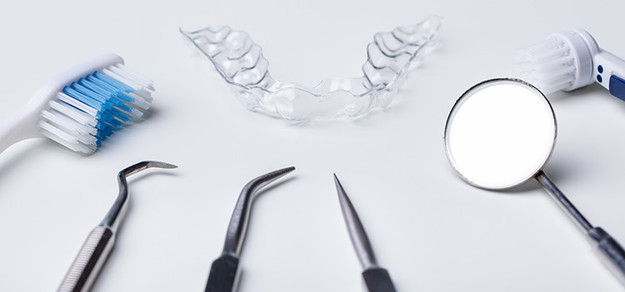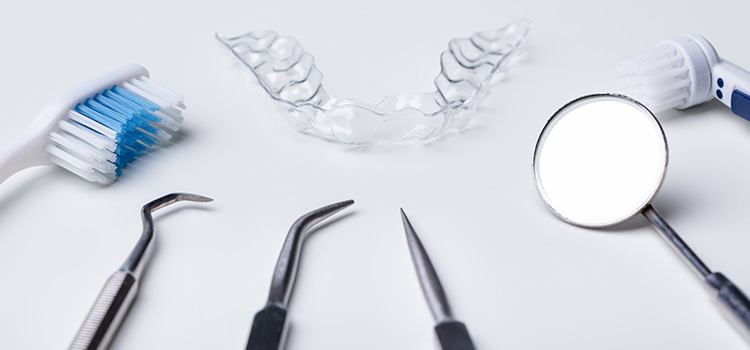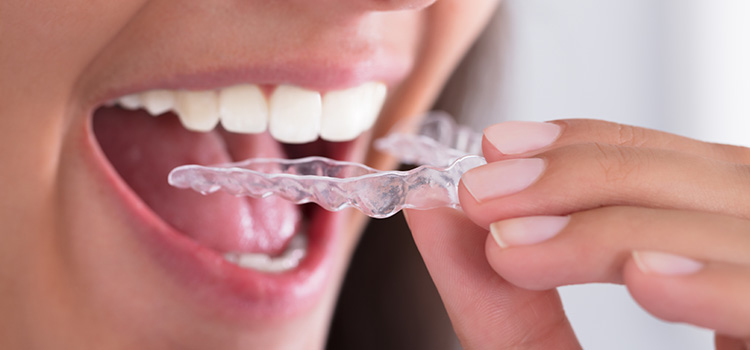Worn Down Teeth Causes and Treatment
12th Jan 2020

Practicing good dental health means brushing and flossing daily, and visiting your dentist for regular checkups and necessary procedures. While you’re working hard to keep your teeth healthy, however, they’re being worn down at a steady pace. Learn what’s behind this troublesome tooth erosion and worn down teeth, and get helpful tips on handling this common problem.
Causes, Prevention and Treatment of Worn-Down Teeth

Worn-Down Teeth: Know the Signs
The term “worn-down teeth” actually refers to erosion of your tooth enamel. This super-thin covering protects your tooth’s crown, which is the portion of the tooth you can actually see. By itself, the tooth’s enamel is translucent and colorless. In contrast, your tooth’s dentin (or the major portion) is responsible for that whitish or yellowish tone.
Your tooth’s enamel coating minimizes tooth damage from chewing, crunching, or grinding your food. In addition, when you drink a very hot or cold beverage, enamel insulates your teeth from the potentially painful sensations associated with temperature extremes.
Unfortunately, you can be affected by gradual tooth enamel erosion. Telltale signs of erosion include yellowish teeth, which occurs because more of the dentin is now exposed. Tooth edges can become jagged and irregular, and you may see or feel indentations on the tooth surfaces. At some point, your tooth structure could be compromised.
When enamel erosion has really kicked in, your teeth will likely be very sensitive to sweet substances and very hot or cold liquids or foods. Finally, enamel erosion makes your teeth more vulnerable to tooth decay and eventual cavities. Front teeth, back teeth, and lower teeth can all be negatively affected by gradual enamel erosion.

Multiple Causes of Enamel Erosion
Enamel erosion (or tooth wear) can have several potential causes. More than one risk factor may apply, which further multiplies your chances of being affected by this condition.
Natural enamel erosion: Repeatedly chewing, grinding, or crunching certain foods can lead to tooth enamel erosion. Following a high-fiber diet, which often includes foods that must be manually broken down before swallowing them, has been associated with higher occurrences of enamel erosion.
Teeth clenching or grinding: Also called bruxism, this friction-based erosion occurs when you voluntarily (or involuntarily during sleep) grind your teeth together. This action gradually wears down each tooth’s enamel surface.
Physical tooth damage: Although you practice good dental health, maybe you’re a bit too aggressive with your toothbrush or dental floss. Perhaps you open bottle caps with your teeth, or regularly chew tobacco. Each action is a type of abrasion, and can physically harm your teeth.

Acidic food or drink consumption: Regularly drinking carbonated soda, seltzer, or sparkling water can lead to tooth enamel erosion. High-acid fruit juices, sour-tasting foods and sour candies have also been linked to loss of your tooth enamel.
Chemically based corrosion: If you take an acid-based medication such as aspirin, or consume a vitamin C tablet, you could be contributing to chemical corrosion of your tooth enamel.
Digestive disorders such as heartburn, GERD, or acid reflux disease might also be to blame. These conditions cause stomach acids to migrate to your mouth, where they damage your tooth enamel. Finally, bulimia, binge drinking, and alcoholism can contribute to tooth enamel erosion due to the diseases’ association with frequent vomiting.
Negative Effects of Worn-Down Teeth
Over time, tooth enamel erosion can cause other troublesome problems, such as tooth sensitivity. If the erosion resulted from grinding or clenching your teeth, the teeth will have uneven wear patterns, and they’ll be out of alignment. Poorly aligned teeth are more vulnerable to chips, cracks, and eventual decay. While expensive repairs for teeth grinding damages may solve the problem, a tooth broken beneath the gum line usually must be pulled.
Consistent tooth grinding can also contribute to jaw joint soreness, and can make it difficult to open your mouth. You may also experience headaches (including migraines), dizziness, and ringing in the ears.
Related Articles:
Worn-Down Teeth: Treatment Options
Treating your worn-down teeth isn’t a cut-and-dried operation. First, know that once your tooth enamel has been eroded, it won’t grow back. Simply put, tooth enamel isn’t living tissue, so it can’t naturally regenerate itself. The “special toothpastes” touted to regrow tooth enamel won’t work, either.
With that in mind, properly treating a worn-down tooth depends on the nature and severity of the problem. Specific cosmetic dentistry procedures often provide a good solution for discolored, chipped or cracked teeth.

Dental Bonding
Dental bonding is a popular option that generally doesn’t require anesthesia and is relatively inexpensive. Once completed, this straightforward procedure helps to repair damage, protect your tooth, and improve the tooth’s cosmetic appearance.
To begin the dental bonding procedure, your dentist roughens the tooth surface. Then, he applies a liquid that enables the bonding agent to adhere to the tooth. Next, he places a tooth-colored composite resin over the liquid, and then properly shapes the tooth. Finally, he hardens the resin with ultraviolet light.
If your tooth has considerable enamel loss, your dentist may suggest a crown instead. This covering fits atop the tooth, and helps to protect it from additional decay.

Mouth Guard
This self-explanatory device ensures that you can’t grind or clench your teeth while you sleep. Also called a “ night guard”, this composite-material device places a barrier between your teeth. When clenching your jaw, the night guard lessens the tension and cushions your jaw muscles. This action protects your tooth enamel and reduces jaw and face pain.
You can buy an over-the-counter mouth guard at your local pharmacy or opt for a custom made night guard. While over-the-counter guards are definitely much cheaper, they typically don’t offer great protection and they aren’t as comfortable. The custom made night guards are formed to fit your teeth exactly and you have a choice of options for the material.
Soft Mouth Guard: Meant for mild tooth grinders of teeth clenchers, this device is the most comfortable night guard. However, it’s not as durable as other options.
Hybrid (dual-laminate) Guard: Designed for moderate tooth grinders, these guards feature a soft interior and hard exterior. The soft interior makes wearing the guard more comfortable while the hard exterior provides durability.
Hard Night Guard: Made from durable acrylic, these night guards are rigid, and are ideal for severe tooth grinders. These guards are effective and very durable, so they can withstand heavy teeth grinding and last a long time.
Related Articles:
Can You Prevent Tooth Wear?
Unfortunately, there isn’t a guaranteed method of preventing enamel erosion. However, you can take several steps that will greatly lessen your risk.
Practice Good Dental Hygiene:
Use your toothbrush and dental floss daily. Always use a fluoride toothpaste, and avoid abrasion to your tooth enamel. In addition, rinse with a fluoride-based antiseptic mouthwash every day. Every six months, visit your dentist for a checkup and thorough cleaning.
Banish High-acid Foods and Drinks:
Stop consuming (or at least minimize) carbonated beverages, citrus juices, and fruits. If you drink an acid-based beverage, use a straw that pushes the liquid right to the back of your mouth. Afterward, rinse with clear water to wash away any leftover acid. Use a similar rinsing (and tooth-brushing) strategy for sugar- or starch-based snacks.
Boost Your Saliva Production:
Saliva bathes your mouth in tooth-strengthening minerals, and also lowers mouth acid. To generate more saliva, chew sugar-free gum (with Xylitol) between meals. Drinking more water will also help to produce higher amounts of saliva.
Sources:
- Dr. James Andrews Comprehensive Dentistry: Worn Teeth Sign of a Bigger Problem
- Dental Health Foundation (Ireland): Tooth Wear
- American Sleep Association: Night Guard for Clenching and Teeth Grinding
- Healthline: Teeth Bonding: What You Need to Know

- Most Popular
- Hard Outside, Soft Inside
- 2MM Thick
- Moderate / Heavy

- Most Durable
- Hard Materials
- 1.5MM Thick
- Heavy / Severe

- For Day Time Use
- Thin, Barely Visible
- 1MM Thick
- Light / Moderate

- For Clenching
- Flexible & Soft
- 1.5MM Thick
- Light / Moderate

